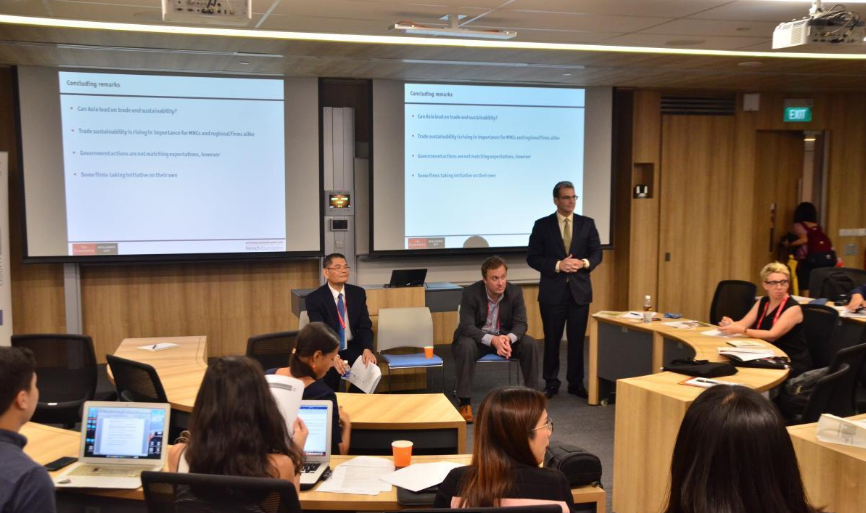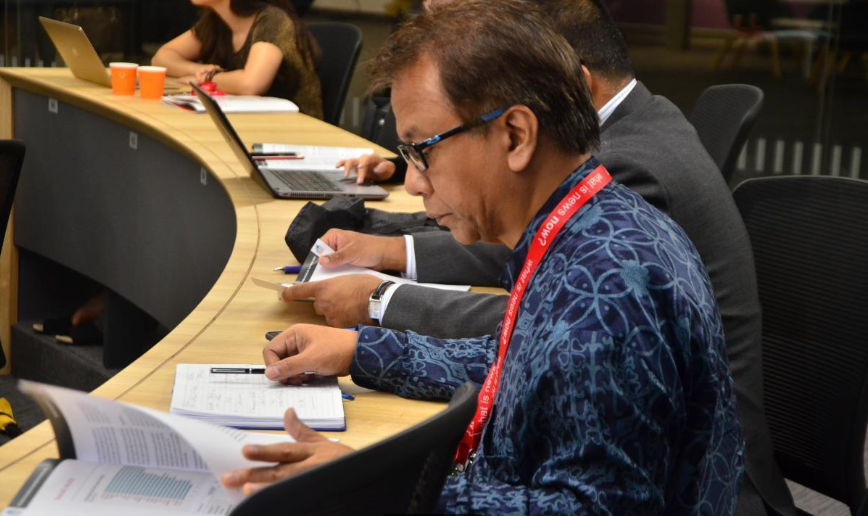Hinrich Foundation Sustainable Trade Index 2018 launched at EWC conference
Published 27 June 2018
On June 26, 2018, Hinrich Foundation and the Economist Intelligence Unit launched the 2018 Hinrich Foundation Sustainable Trade Index at the East-West Center’s (EWC) International Media Conference in Singapore. The EWC event at Singapore Management University was attended by hundreds of media professionals from across the world.
The Hinrich Foundation hosted a breakout session at the event, called “Sustainable Trade Index new findings: Is Asia Pacific moving forward or backward?”, to present the newly released results from the 2018 Hinrich Foundation Sustainable Trade Index— which was built by the Economist Intelligence Unit to measure the readiness of 19 economies in Asia and the U.S. to trade sustainably.
The event featured presentations and analysis from the following expert panelists:
- Stephen Olson, Research Fellow, Hinrich Foundation
- Chris Clague, Managing Editor Asia & Global Editorial Lead, Trade and Globalization, Economist Intelligence Unit
- Dr Ponciano Intal Jr., The Economic Research Institute for ASEAN and East Asia (ERIA)

Stephen Olson of the Hinrich Foundation opened the event with an introduction of the Sustainable Trade Index project and its purpose: to stimulate meaningful discussion of the full range of considerations for policy makers, business and civil society when engaging in international trade. Olson also gave an overview of the key themes that emerged from the new 2018 report, including:
- Trade sustainability is rising in importance for multinational companies when making decisions about foreign direct investments (FDI) and sourcing. MNC’s are restructuring their supply chains to improve the sustainability of their operations.
- Yet, there is an alarming trend of economies in Asia, particularly the richer ones, broadly regressing in their trade sustainability – indicating a disconnect with corporate expectations.
- In the context of escalating trade tensions, trade sustainability is now more than ever critical to avoid further destabilizing our global trade system and for economies in Asia to continue reaping the benefits from trade.
- Asia’s commitment to trade-related growth and success appears stronger than ever. As such, Asia now finds itself in a unique position to help lead and sustain the global economy’s commitment to global trade, provided that it makes improvements on trade sustainability.
Olson’s introduction was followed by a presentation by the Economist Intelligence Unit’s Chris Clague, who broke down the performance of the 20 economies on the Index. Clague pointed out the top and bottom performers across the three pillars of sustainability: Economic, social and environmental. His featured remarks included the following findings:
- Hong Kong edged out Singapore and South Korea to take the top spot on the index.
- Many of Asia’s wealthier economies, including South Korea, Singapore, Japan and Taiwan, though atop the overall rankings, saw their scores decline from 2016.
- Several middle-income countries such as Sri Lanka, China and Vietnam have leapfrogged the richer (in per-head terms) economies on the index.
Clague’s presentation was followed by analysis from Dr. Ponciano Intal Jr. from ERIA. Dr. Intal emphasized the importance of sustainable trade for development in the region and pointed out certain areas that need special attention including education and infrastructure. The event concluded with a brief question and answer session with the audience.

© The Hinrich Foundation. See our website Terms and conditions for our copyright and reprint policy. All statements of fact and the views, conclusions and recommendations expressed in this publication are the sole responsibility of the author(s).


